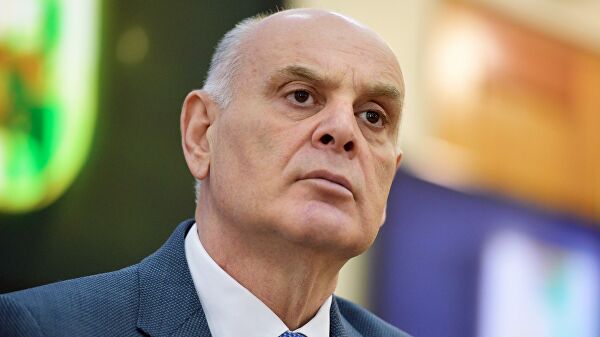Bzhania: Abkhazia Should Accommodate Putin with Bichvinta Dacha Transfer
On November 17, the leader of the occupied region of Abkhazia, Aslan Bzhania, declared his readiness to accommodate Vladimir Putin by putting the state Soviet -era “dacha” property in Bichvinta (the so-called “Pitsunda state dacha”) at his disposal. The statement was made during a meeting with Abkhaz students on International Students’ Day.
The question about the controversy surrounding the status of the transfer of the Bichvinta dacha and of the so-called apartment law came from a student attending the meeting.
Bichvinta State Dacha
Bzhania responded by explaining that the Bichvinta case involves the transfer of ownership of buildings and structures, not the land on which they stand, for reconstruction and major repairs [ed.- the complex covers 4,000 sq. meters].
Bzhania emphasized that Putin has visited Bichvinta several times and plans to continue these visits, noting that the Russian side requested to receive the dacha so that investments could be made to reconstruct these properties to make them more suitable for the Russian President. “According to their legislation, they can’t make capital investments abroad… if the properties are not under their ownership.”
“He… intends to make there a residence, a modern residence, for his needs. And I think it will be right to meet his needs. And I think that the majority of citizens think so… So this work is actually going on. A lot depends on it,” – said Aslan Bzhania, adding: “This is not only a legal issue, it is also a political one”.
Bzhania noted that the controversy over the Bichvinta transfer is being “fed in” to put Abkhazia’s relations with Russia and the Russian people “on the same level” as relations with European countries that “ignore us”. He stated that there is a “special relationship” between the region and Russia, noting that many of the students attending the meeting have Russian citizenship, that the population feels close to Russians, use the Russian language, and “the only window to the world [they] have today is through Russia.”
He also referred to the current war between Russia and Ukraine as the “conflict on the European continent,” and in this context advocated closer relations with Russia in these difficult times, saying that “everybody is against Russia”.
It was first decided in 1995 that Bichvinta would be transferred to Russia through a long-term lease, although no practical steps have been taken since then. Russia has stepped up its efforts to finalize the deal, with the text of a new agreement to transfer the land for 49 years emerging on January 19, 2022, which has yet to be ratified. The issue has been a hot topic of discussion in Abkhazia ever since, with both the public and officials divided on the matter. In May this year, young activists were arrested while protesting against the transfer.
Temur Nadaraia, former head of Gali administration, stated at the de facto public council of the Abkhaz foreign affairs establishment meeting held last year that the main source of the controversy is that the “authorities do not discuss such sensitive issues with the public in advance. The wide outcry is caused precisely by this and not by anti-Russian sentiments.” Ruslan Khashig, director of Abaza-TV and long-time journalist, claimed that “no one is against the transfer of the resort to Russia but it is necessary to make a legal examination of this document.” Inal Ardzinba, the foreign minister, promised to hold a meeting with the “Russian ambassador to Abkhazia” Mikhail Shurgalin to discuss the matter further.
Apartment Law
Regarding the Apartment Law, Bzhania noted that aparthotels are being built in Abkhazia without a regulatory framework for their construction, and stressed that the main purpose of the law would be to regulate the issue of where and how these apartments are built. He noted that these aparthotels are needed because despite Abkhazia’s tourism potential, the region is falling behind due to the lack of hotels to accommodate incoming tourists.
He also addressed the prominent argument of the law’s opponents, who say that because these apartments can be sold to foreigners, it would upset the demographic balance in Abkhazia. Bzhania explained: “There is no demographic threat here, because the people who travel here have no political rights.”
He noted that the biggest investment opportunity that Abkhazia has right now is through these aparthotels, adding that the region doesn’t have the financial capacity to cope with the amount of infrastructure that needs to be reconstructed or rebuilt. He noted that over the past 30 years almost all infrastructure projects have been done with the help of Russian financial assistance and therefore to discuss to discuss whether to give Pitsunda Dacha [to Russia] or not- “this is not a right discussion, this is a bad discussion.”
The context: de facto Foreign Minister of the occupied region Inal Ardzinba announced last week that international NGOs that consider Abkhazia to be occupied territory will soon be banned from entering the region. Meanwhile plans are underway for cooperation between the Russian-annexed Ukrainian peninsula of Crimea and the Russian-occupied region of Abkhazia to revive the old Soviet-era “Kometa” sea route connecting the cities of Gelendzhik – Novorossiysk – Sochi – Sokhumi.
The de facto foreign minister of the occupied region, Inal Ardzinba, recently stated that Abkhazia’s accession to the Union State with Russia and Belarus is “is fully in the fundamental interests of the people of the republic”. Sergei Shamba, the so-called “secretary of the Security Council” and “ex-Prime Minister”, has claimed that Abkhazia is “part of the Russian world”.
Also Read:
- 24/10/2023 – Ukraine’s Defense Intelligence: Russia Plans to Relocate Black Sea Fleet from Crimea to Abkhazia
- 07/10/2023 – Context | Russian Navy Base in occupied Abkhazia?
- 29/08/2023 – Karasin: Russia Does Everything Possible so China and India Recognize Abkhazia and South Ossetia
This post is also available in: ქართული Русский
